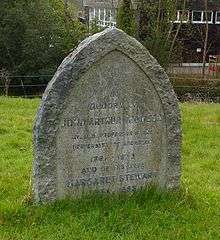John Arthur Thomson
.jpg)
Sir John Arthur Thomson (8 July 1861 – 12 February 1933) was a Scottish naturalist[1][2] who authored several notable books and was an expert on soft corals.
Biography
Born in Saltoun, East Lothian, he taught at the Royal (Dick) Veterinary College from 1893 until 1899 then University of Aberdeen from 1899 until 1930, the year he was knighted. His popular works sought to reconcile science and religion. Thomson's Outline of Science, published in 1922, sold more than one hundred thousand copies in five years.[3]

In his Gifford lectures and a number of books written with his friend Patrick Geddes he argued for a form of holistic biology in which the activity of the living organism could transcend the physical laws governing its component parts.[4][5] Some had termed the work of Geddes and Thomson as neovitalist though the position presented in their books is more closer to panpsychism as Thomson had claimed that mind can not emerge from matter and that it has existed in nature all the time. Thomson had believed there was life at all levels, he wrote that "there is nothing inanimate". He had however found the vitalist ideas of Henri Bergson inspirational.[6]
According to Peter J. Bowler Thomson was a popular science writer who had promoted a nonmaterialist interpretation of science though his interpretation was not accepted by all within the scientific community as some had claimed his views were neovitalist and thus outdated.[7]
Thomson had also promoted the importance of symbiosis and cooperation in nature as opposed to the idea of struggle.[8]
While at the University of Aberdeen Thomson supervised the research of respected carcinologist Isabella Gordon.[9]
He died in Limpsfield, Surrey. One of his sons was the ornithologist A. Landsborough Thomson.
References
- ↑ "Thomson, John Arthur". Who's Who. Vol. 59. 1907. p. 1743.
- ↑ Ritchie, James (4 March 1933). "Sir J. Arthur Thomson". Nature. 131: 296. doi:10.1038/131296a0.
- ↑ Rhees, David J (1979). THE NEW PUBLIC INTEREST IN SCIENCE (CHAPTER I - PART III). via Smithsonian Institution. Retrieved December 22, 2006.
- ↑ Peter J. Bowler Reconciling science and religion: the debate in early-twentieth-century Britain 2001, p. 170
- ↑ Peter J. Bowler Science for all: the popularization of science in early twentieth-century 2009, p. 24
- ↑ Peter J. Bowler Monkey Trials and Gorilla Sermons 2009, p. 148
- ↑ David M. Knight, Matthew Eddy Science and beliefs: from natural philosophy to natural science, 1700-1900 2005, p. 231
- ↑ Scott Mandelbrote Nature and Scripture in the Abrahamic Religions: 1700-Present, Volume 2 2008, p. 196
- ↑ Holthius, L.B.; Ingle, R.W. (1989). "Isabella Gordon, D.SC., O.B.E.: 1901-1988". Crustaceana. 56 (1): 93–105. doi:10.1163/156854089x00833. JSTOR 20104425.
Selected bibliography
- Darwinism and Human Life (1910)
- What Is Man? (1923),
- Science and Religion (1925)
- Modern Science (1929)
- The Outline of Science [editor] (4 vol., 1922; repr. 1937)
"Heredity" (1907)
External links
| Wikisource has original works written by or about: John Arthur Thomson |
- Works by John Arthur Thomson at Project Gutenberg
- Works by or about John Arthur Thomson at Internet Archive
- Works by John Arthur Thomson at LibriVox (public domain audiobooks)

- Portrait of Sir John Arthur Thomson